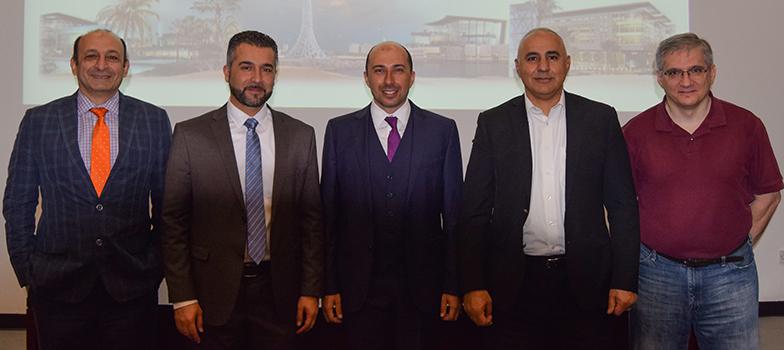- About
- Admissions
- Study at AUS
- Prospective Students
- Bachelor's Degrees
- Master's Degrees
- Doctoral Degrees
- Admission Publications
- International Students
- Contact Admissions
- Grants and Scholarships
- Sponsorship Liaison Services
- Testing Center
- New Student Guide
- File Completion
- New Student Orientation
- Payment Guide
- Executive Education
- Students with Disabilities
- Academics
- Life at AUS
- Research
- Contact Us
- Apply Now
- .

AUS hosts talk on supercomputing and its applications
The High-Performance Computing (HPC) Center at American University of Sharjah (AUS) hosted a talk on supercomputing and its applications in scientific computing and data sciences.
Dr. Saber Feki, Lead of the HPC Computational Scientist Team at King Abdullah University of Science and Technology (KAUST), highlighted the role of supercomputing in addressing many of today's increasing scientific, engineering, economical and societal challenges.
He further provided an overview of some of the scientific discoveries and industrial success stories enabled by KAUST Supercomputing Core Labs' supercomputing facilities.
He concluded his speech with a discussion on future architectures targeting a mixed workload including simulation, big data analytics and artificial intelligence.
More than 100 faculty members, students and staff members attended the event.
Highlighting the importance of this talk, Dr. Fadi Aloul, Head of Computer Science and Engineering, and the Interim Director of the High Performance Computing Center at AUS, said:
"The visit of Dr. Feki was really important as it touched on issues that are very relevant to the work of the university's four research institutions and centers. KAUST has one of the fastest HPC machines. Since AUS is moving towards acquiring one of the largest HPC machines in the UAE, the visit was crucial as it involved the senior administration of the university from the operational side and faculty from the technical side."
He added: "The university's four research centers will have many different applications for this HPC machine as it will allow for information to be processed instantly producing quicker results."
In response to the needs and aspirations of the country and the region, AUS has established four interdisciplinary, PhD-granting research institutes. These are the Biosciences and Bioengineering Research Institute (BBRI), Gulf Environments Research Institute (GERI), Smart Cities Research Institute (SCRI) and Materials Science and Engineering Research Institute (MSERI). To support research within the four institutes and across campus and to ensure the research conducted is regionally relevant and contributes towards finding innovative solutions to serve society and develop and augment a knowledge-based economy, two advanced research centers were established. These are: High-Performance Computing Center (HPCC) and the Geospatial Analysis Center (GAC).

